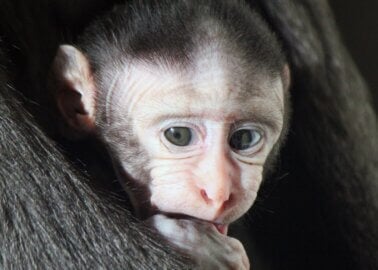Real-World STEM Lessons: Fighting COVID-19 Without Hurting Animals
With the world in the grip of a pandemic, it’s important that we keep our students up to speed on current events and find ways to inspire them to consider further study and careers in STEM fields. Equally important is highlighting the myriad ways scientists are working hard to develop much-needed treatments and vaccines for COVID-19, the disease caused by the novel coronavirus.
Around the globe, there are a number of animal-free experiments already underway aimed at developing a vaccine or treatment for COVID-19. Given the scale and seriousness of this pandemic, researchers can’t afford to waste time conducting useless tests on animals.
PETA and compassionate people everywhere were heartened to learn that, in order to speed up the development of a potential coronavirus vaccine, the US National Institutes of Health (NIH) quickly began testing directly on humans without waiting for the results of a typical, lengthy animal testing phase. This move by NIH demonstrates that the results yielded by those tests on animals are irrelevant.
Here are some more examples of innovative ways coronavirus researchers are avoiding cruel and archaic tests on animals in favour of cutting-edge, human-relevant methods:
- Three-dimensional reconstructed human respiratory tissue models, such as those from Epithelix Sàrl and MatTek Life Sciences, can be used to study COVID-19 infection and screen for potential treatments. A long-time supporter of both companies, the PETA International Science Consortium Ltd.helped fund the development of a first-of-its-kind model of the lower respiratory tract, EpiAlveolar, available from MatTek Life Sciences. This three-dimensional model is composed of human cells from the lower respiratory tract. The cells can be exposed to the test material in the air on one side while receiving nourishment from a nutrient-rich liquid on the other – similar to the workings of a human lung.
- Scientists at Gauhati University in India used advanced computer-simulation methods to work out which parts of the virus are best suited to triggering an immune response in humans. This work could contribute to the design of safe and effective vaccines against COVID-19.
- Researchers at the University of Bristolare growing the virus responsible for COVID-19 in cell lines to investigate how it hijacks the cellular machinery and causes disease. Using this technique, they’ve already discovered that the virus mutates when it’s grown in monkey cell lines. This could mean that the results of COVID-19 tests on primates are even less relevant to humans than previously thought.
- Researchers at Oak Ridge National Laboratory in the US are using Summit – the world’s smartest and most powerful supercomputer – to identify existing drugs that could be effective in treating COVID-19 in humans. Based on the physical properties of the virus and of each drug, the computer predicts how the two might interact. The effectiveness of promising drugs can then be measured by testing them on cells infected with the virus. Many of the drugs currently in human clinical trials were identified using these artificial intelligence–based methods.
- Scientists in London are exploring the possibility of infecting human volunteers with other, similar coronavirus strains (that are not known to cause COVID-19) in a safe and controlled way to help pharmaceutical companies safely test potential vaccines and antiviral drugs.
In this time of great uncertainty and confusion, there’s one thing we do know for sure: experimenting on animals is not only unethical but also unjustifiable from a scientific perspective.
NIH reports that 95 out of every 100 new drugs that pass animal tests fail in humans, usually because they are either unsafe or ineffective. Mice – who have to be genetically engineered just to be susceptible to the disease – show only mild symptoms of COVID-19. Dr Stanley Perlman, a coronavirologist at the University of Iowa, notes that infecting mice “doesn’t really tell you much about how the virus causes disease”.
Suggested Activities for Secondary School Students
- Position Paper: Ask students to choose the innovation that they’re most interested in among those described above and to research it further. Then, from the perspective of the scientist using the non-animal method, they should write a position paper addressing the following questions: why did they choose this humane method instead of using animals? How will the innovation benefit human health? Which disciplines or courses of study would students need to pursue in order to develop similar techniques? For example, students may start by writing, “I’m a researcher at Oak Ridge National Laboratory in the US. I’ve chosen to use a supercomputer instead of experiments on animals to try and find drugs that already exist that could treat COVID-19 …”
- Debate: Use TeachKind’s Should Animals Be Used in Experiments? debate kit to help students develop a cogent argument that animals should not be used in experiments, citing examples from the COVID-19 testing methods described above. The guiding questions for this activity are the following: if experiments on animals aren’t necessary to combat COVID-19, should they be used to study this disease or other conditions? Should animal experiments be used in the future? Why or why not?
- Invention: Ask students to create a new animal-friendly research method to test the effectiveness of potential COVID-19 treatments or to replace the use of animals in experiments in another way. Provide them with this overview of some non-animal research methods for inspiration. They should write a pitch asking a government body (e.g. the Biotechnology and Biological Sciences Research Council) to fund the development and implementation of their new method. They must describe what the method is, how it works, how it would protect human health, and how it would spare animals’ lives.
Make Archaic Animal Tests History
The tide is turning, and more and more forward-thinking scientists are adopting research methods that benefit humans without harming animals. Help keep up this momentum by urging the UK government to commit to ending the use of animals in experiments:




